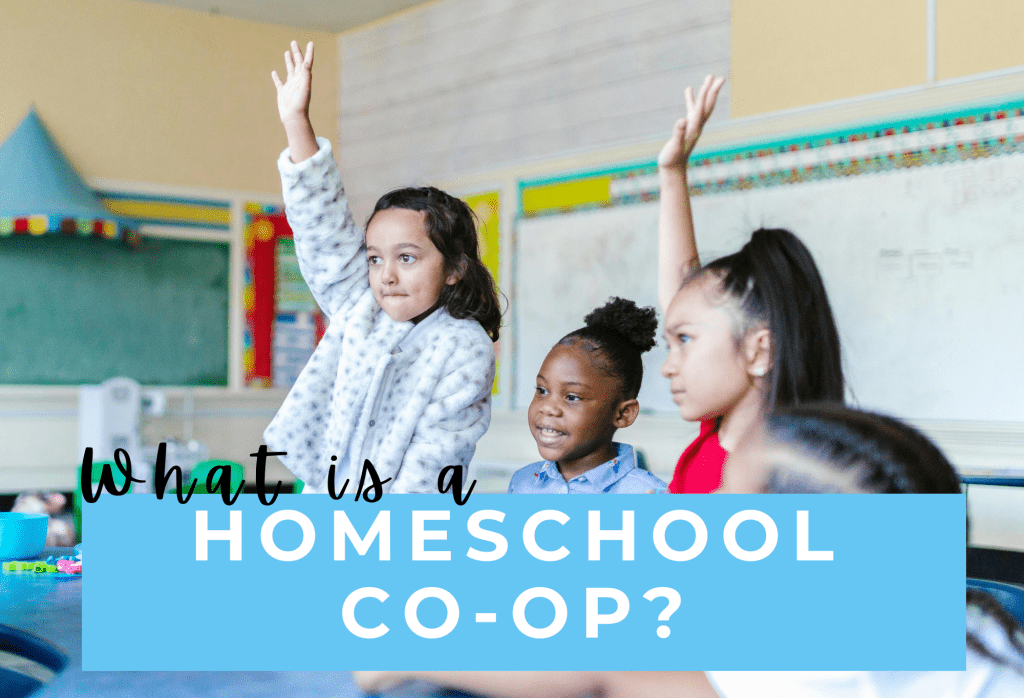
As you begin to homeschool, you’re destined to hear about homeschool co-ops. But what is a homeschool co-op and should you join one? We’ll talk about the ins and outs of homeschool co-ops to help you determine if joining one is right for your family.
What is a homeschool co-op?
A homeschool co-op is a group of homeschooling families who come together cooperatively to share the task of educating their children. In general, it is where you see parents sharing the responsibility of teaching each other’s children, borrowing from the talents and expertise of others.
These co-ops take many forms! A co-op can be as small as two or three families grouping their children together to learn or as large as hundreds of families coming together to offer a large variety of available courses and classes similar to a private school.
In some states, homeschool co-ops tend to use the term homeschool pods – they’re basically the same thing!
How do homeschool co-ops work?
A homeschool co-op is not a school and it’s not designed to take the place of the homeschool, either.
Co-ops are born when several families of homeschoolers come together to help each other school their children. Usually the parents are the teachers or the families chip in together to hire a teacher for their combined students.
Most commonly, co-ops meet one day each week while the parents continue homeschooling on the other days of the week. The families involved in the co-ops agree upon a pre-determined shared calendar. Typically, co-ops do not teach all aspects of the curriculum, but only certain courses as agreed upon by the families involved.
Small homeschool co-ops may meet in homes while larger groups may utilize places like the library, a church building, or other community building.
>>> What Subjects Should I Teach in Our Homeschool?

Types of homeschool co-ops
Academic Co-ops
Typically, academically oriented co-ops meet weekly and offer core academic classes for students. The co-op teacher is often a parent but may be someone from the community. This teacher designs the class scope and sequence, also determining the books that will be used.
All the students participating in the class purchase the same books before class begins. The co-op course operates as a flipped classroom with students coming together for weekly instruction but completing the primary work at home with their family.
In this type of co-op, you are likely to find classes such as Biology, Intro to British Literature, Astronomy, Pre-Algebra, Latin, Spanish and similar courses for upper grades. For younger learners, classes might include Energy and Matter, Ancient History, Fables and Fairy Tales, Math, or Composition.
Academic co-ops can be particularly useful during the middle school and high school years. This is when parents sometimes struggle to feel competent to teach their children across all academic areas. Let’s face it! You might be great at literature and stink at math. So, finding another parent who can teach Algebra, for example, to your child can be incredibly helpful!
>>> My Top 6 Favorite Homeschool Curricula
Extra-curricular Co-ops
Sometimes families come together to offer electives or enrichment classes for students. These kinds of co-ops are great for encouraging social interaction and introducing kids to enrichment classes best suited to groups instead of individuals.
Enrichment co-ops also typically meet once a week, although sometimes they meet only every other week or once a month. These co-ops may also focus on fieldtrips and additional enrichment opportunities that the group can attend within the community such as theater productions or touring a fire station.
Classes in this type of co-op might include art, PE, robotics, sign-language, cooking, soccer, ballet, crafts, photography, or chorus.
Combination Academic + Extra-curricular Co-ops
Sometimes you find a co-op that offers both academic and elective courses. These are my favorite type! In these types of co-ops, parents can choose from a variety of courses to meet the needs of their children. They often offer some academic courses combined with fun, extra-curricular classes.
>>> What To Do on the 1st Day of Homeschool
Classical Conversations
Classical Conversations is a nationally organized Christian co-op with many small chapters scattered around the country. It is primarily an academic co-op, adhering to the classical style of homeschooling. The curriculum is pre-determined by the Classical Conversations board, so all participants study the same materials.
These groups meet weekly and parents act as the teachers. Those parents who are not teaching are required to attend classes with their children in order to reinforce the concepts correctly at home. Although it is fairly expensive, some families feel the cost is worth the strong community and sense of direction provided by having all curriculum choices made for you.
Do Co-ops Cost Money?
Some co-ops are free and others are very expensive. Usually, they start off free and local, but as they grow the co-op incurs expenses in needing a larger meeting place, insurance, and other costs that is then passed on to parents. Additionally, parents need to cover the cost of books and materials.
Some co-ops, such as Classical Conversations, are overseen by a national organization and are quite expensive.

New to homeschooling? This is just what you need. Grab a copy of the eBook or printed version – available on Amazon.
Where Can I Find Co-ops?
Admittedly, finding a homeschool co-op can sometimes be a challenge. Start with an internet search online for homeschool co-ops in your area but understand that many co-ops do not have a website. Facebook groups are another great place to search for information.
If you have a homeschool store nearby, there may be a bulletin board where notices can be posted the old-fashioned way. Homeschool conferences could be another source for locating co-ops.
Get out and meet other homeschool families, too, and talk to them to see if they know of any co-ops. The best way to meet other home school families is to go to the park, library, or grocery store with all your kids during school hours, especially just after lunchtime. Everyone else is in school, so if you see a Mom with her school age kids, they are probably homeschoolers, too! Start a conversation!
>>> What’s Your Child’s Homeschool Learning Style?
Should We Join a Co-op?
There are pros and cons to joining co-ops! As you plan for your homeschool, there may be years you want to be a part of a co-op and others when you do not. The choice is completely yours!
In an upcoming post, we will explore some of the pros and cons of joining a co-op.
